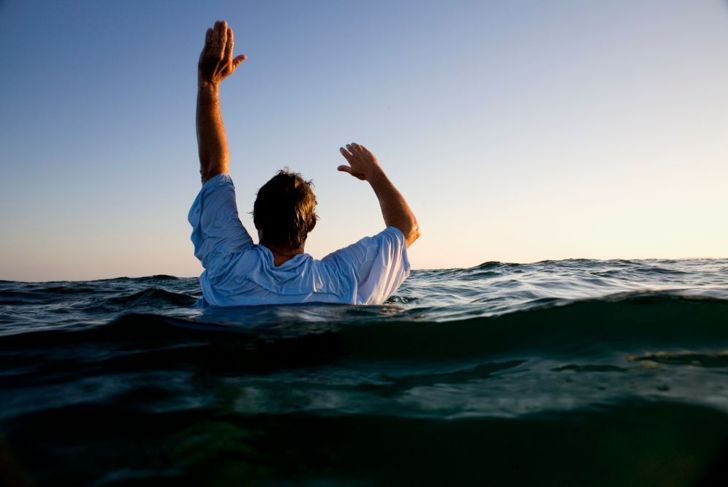Hydrophobia is an excessive and persistent fear of water. People with hydrophobia feel terror and anxiety when thinking about any kind of water, and these feelings often prevent them from getting near pools and oceans. Some individuals have such extreme hydrophobia that even bathtubs or a full sink can elicit fear.
Etymology: Hydrophobia vs. Aquaphobia
There is some debate over this phobia’s name. While hydrophobia is accurate, as both root words have Greek origins, this term already has a medical definition. Hydrophobia is an archaic name for a symptom that occurs in the later stages of rabies and has no relation to a fear of water. As a result, many people have chosen to adopt “aquaphobia” as the name for this truth. In most cases, either one is acceptable, and the context should reveal the meaning.
Symptoms and Effects
Seeing, thinking about, or touching water can trigger symptoms in people with hydrophobia. The actual effects vary and are dependent on the severity of the phobia. Hydrophobia is a specific phobia, so its symptoms resemble those of other specific phobias. For most people, this includes:
- Fear or anxiety when thinking about the fear-inducing item or topic
- Recognizing their reaction is excessive
- Taking actions to avoid the item
- Sweating
- Difficulty breathing or tight chest
- Nausea and dizziness
Genetic Causes
Experts do not know what causes specific phobias like hydrophobia, though there are many theories. Genetics may play a key role in the development of various phobias. Many studies show that phobias are inheritable: a person with a family history of mental health conditions is more likely to develop one. Additionally, some experts believe that phobias are a lingering survival instinct. In cases of hydrophobia, the terror may stem from a legitimate fear of drowning that has become excessive.
Other Causes
Other theories on the origins of phobias involve past experiences. A near-drowning in childhood may result in a lifelong fear of water. The phobia may also result from a series of negative events involving water, rather than a singular, extremely traumatic event. Some sources also believe that changes in brain function can result in phobias. These changes can stem from hormonal changes during the menstrual cycle, for example, which may explain why women are twice as likely as men to develop anxiety disorders like specific phobias.
Specific Phobias
A specific phobia is an unreasonable fear of a certain object or situation. This fear or the avoidance of the object causes disruptions in a person’s life. To have a specific phobia, an individual must meet several criteria from the DSM-5. For hydrophobia, these include:
- Fear of and anxiety about water
- Water almost always provokes immediate anxiety or fear
- The feelings are out of proportion to water’s actual danger
- Active avoidance of water
- Water causes clinically significant distress or impairment
- The issue is persistent, lasting at least six months
- Another condition does not more accurately fit the issue
Diagnostic Process
Generally, healthcare professionals do not diagnose phobias by name. Instead, they diagnose somebody as having a “specific phobia” according to the diagnostic requirements in the DSM-5. Because a requirement for diagnosis is eliminating other conditions, mental health specialists must rule out obsessive-compulsive disorder, post-traumatic stress disorder, panic disorder, and many other issues. During this process, the practitioner will ask questions about when the phobia began, its effects, and if there was an instigating event.
Using Exposure Therapy
One of the most popular treatments for specific phobias is exposure therapy. The mental health professional exposes their patient to the object they fear, with the goal of helping them gradually overcome the phobia. The process takes place over many sessions. For someone completely avoiding water, the doctor may begin showing photos of water, then gradually increase exposure, working up to baths and showers. Eventually, they may take their patient to a large body of water. During this process, professionals will teach the skills and techniques to manage anxiety.
Using Cognitive-Behavioral Therapy
Cognitive-behavioral therapy (CBT) is considered one of the most effective treatments for phobias. A person with a phobia feels that the object of their fear is inherently dangerous. CBT teaches those with phobias to better manage the anxiety and fear they feel. Over several sessions, the practitioner helps their client develop a sense of control over their thoughts and feelings. Cognitive-behavior therapy may involve exposure therapy.
Medications for Treatment
Though rare, mental health specialists can prescribe medications for phobias. Usually, the prescription is short-term and only for cases where the phobia is dramatically affecting the individual’s life. Beta-blockers can block the effects of adrenaline, such as shaking and increased heart rate and blood pressure. Sedatives may also be useful for managing anxiety, but these are usually much stronger medications that are more addictive.
Other Water Phobias
Hydrophobia is not the only phobia stemming from a fear of water. Others of this type are more specific. Thalassophobia is a fear of deep bodies of water like the ocean. Bathophobia is similar and is a fear of depths, like a well or deep lake. Ablutophobia is specifically a fear of washing or bathing. The similarity of these phobias makes it difficult to identify or differentiate between them.

 Home
Home Health
Health Diet & Nutrition
Diet & Nutrition Living Well
Living Well More
More




















